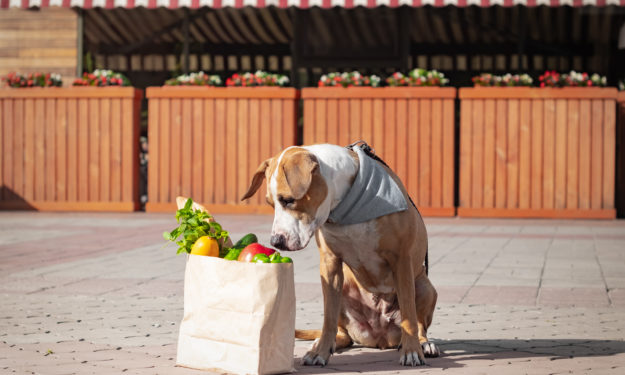The Skinny on Raw Food Diets

Written by Sarah Cocker, DVM, Residency trained in Internal Medicine
Raw meat-based diets (RMBD), is an emerging trend with pet owners. Raw meat-based diets are those that contain uncooked or undercooked food animal species that are fed to dogs and cats. These diets can be found commercially or prepared at home and some are stored frozen or freeze-dried. People in favor of RMBDs view them as natural and closer to what a wild dog or cat would eat.
Most of the claimed nutritional benefits of RMBDs are simply opinions with no proven scientific research, but sound plausible to well-intended pet owners. There is very little research showing that RMBDs provides any health benefits over cooked commercial pet food diets. There is some evidence showing improvement in intestinal microbiome (good bacteria) in dogs and improved digestibility in dogs and cats fed raw diets. However, the clinical effects of these differences are unclear and require further study.
In contrast, there are several reports of vitamin and mineral imbalances in RMBDs causing illness in dogs and cats fed those diets. These include excessive or deficient amounts of vitamin A, E and D, calcium, phosphorous, iodine, copper and zinc. Many of these diets can be high in fat, which puts some pets at risk for pancreatitis, gastrointestinal issues and obesity. The largest concerns associated with RMBDs are contamination with pathogens such as Salmonella, E. Coli, Campylobacter spp. Clostridium spp., Listeria spp., Echinococcus spp., and Toxoplasma spp. These pathogens can cause illness in dogs and cats and several have zoonotic potential meaning that they can be transmitted to humans from infected pets. This becomes a huge concern for children, immunocompromised adults, and pets that come in contact with infected pets and can have life threatening consequences.
Most veterinarians are not in favor of raw food diets and owners need to be educated about the risks of these diets before feeding them to their pets. If an owner elects to feed a RMBD then it is best to purchase one that adheres to AAFCO nutritional guidelines or if home preparing these diets, a veterinary nutritionist should be contacted to ensure the diet is nutritionally balanced. It is also important to be very careful with the storage, handling, and preparation of these diets to decrease risk of contamination.